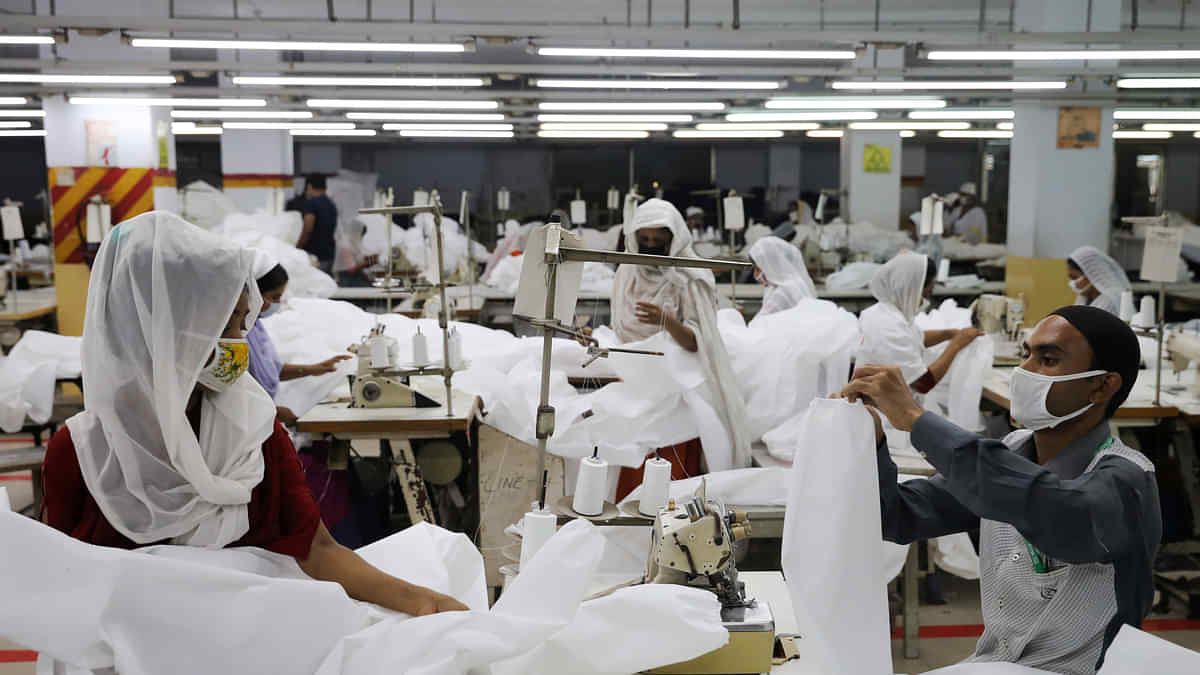All the RMG products manufactured in Bangladesh will use a tag containing ‘Bangladeshe Toiri’ in Bangla along with ‘Made in Bangladesh’ from 1 January, 2024, said BGMEA president Faruque Hassan.
He said, the association is working on putting the “Bangladeshe Toiri” tag in the export products along with the existing “Made in Bangladesh” tag.
The Bangladesh Garment Manufacturers and Exporters Association (BGMEA) also wants a change to the Bangladesh EPZ Labour Act in order to guarantee trade union and other rights of the workers, which are also a major demand of the US and European Union (EU) authorities.
The apex body for the garment industry also believes that all sectors should have rights that are equal, and BGMEA is dedicated to upholding workers due diligence and human rights.
BGMEA President Faruque Hassan talked about it while responding to questions from the journalists at a press conference held on Saturday at its office in the capital.
“We believe that workers have rights to form trade union in everywhere, but problem is the foreign investors, who invest in the Export Promotion Zones (EPZs), they don’t want this,” he added.
Regarding the minimum wage board, he said that they’ve already submitted three names to the labour ministry in response to their requirement. Once the ministry forms it, apparel manufacturers would voluntarily embrace the new pay.
In response to a question, Faruque said that Bangladesh would continue to benefit from Generalized System of Preferences (GSP) treatment from the EU, the UK, and other nations until 2029 due to its graduation from the Least Developed Countries (LDC) category (LDCs).
However, the top body is aiming to extend it, at least through 2032, and the government is supporting their initiative as well.
They already have held meeting with the World Trade Organization (WTO) Director General, the EU’s senior officials, and the UK’s appropriate authority in this regard.
“Our objective is clear. After LDC graduation, we do not want to take punishment (impose responsibility) due to development trap. We might easily enter the global market as competitors if we can keep the GSP till 2032,” he added.
“We have two logics to expand facilities. First, we are facing economic crisis due to the ongoing Russia-Ukraine war, which was their (US, EU) problem. The Second issue is, Bangladesh accepted 1.3 million Rohingyas, one of the highest ever refugee acceptances in the world,” he added.
So, the global communities should increase the GSP tenure for Bangladesh considering these issues.
In response to another question, he said that businesses are not doing so well.
“Our export to the US market has been dropped, though we have tremendous growth in the new markets such as India, Japan and South Korea,” he said.
He also said that the rise in the gas price, electricity price is affecting the sector.
Moreover, global economic turmoil, inflationary pressures have curtailed the purchasing capacity and the buyers have changed their sourcing pattern.
“Currently, they place orders in small slots which are hampering the production plans,” he added.
The BGMEA president said that Bangladesh has a huge potentiality in the circular economy, especially recycle textile waste. “BGMEA is looking for foreign investors in the area, and that is why they are seeking government policy support,”
BGMEA Vice-President Md Nasir Uddin, Sparrow Group Managing Shovon Isalm, JFK Fashion Managing Director M Kafil Uddin Ahmed were also present at the press conference.
News Source : https://prothomalo.com

